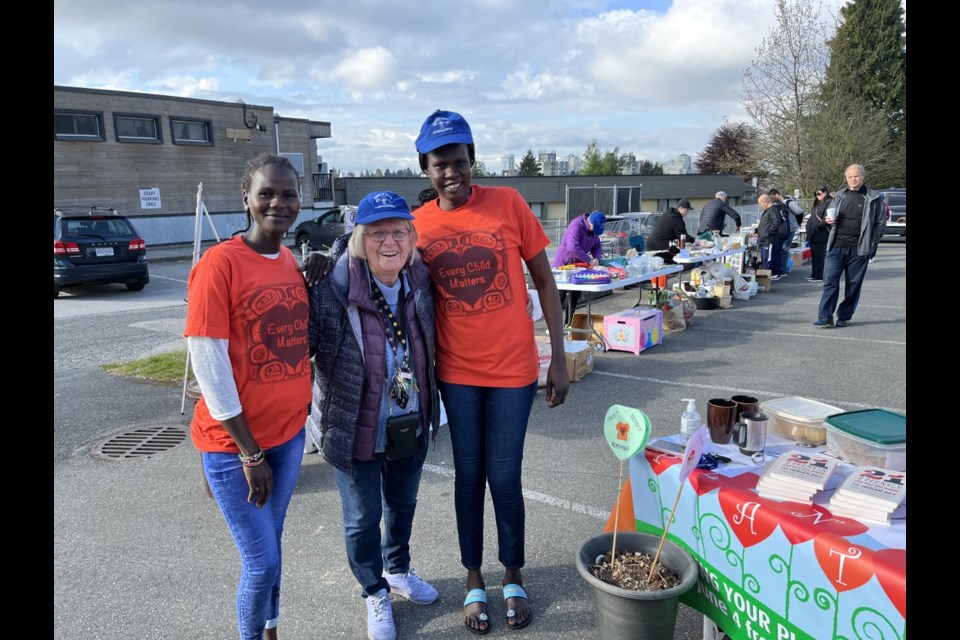Honouring Memories – Planting Dreams is about much more than sticking a paper heart in the ground and calling it a day.
Mount Zion Lutheran Church is inviting community members to help create a heart garden in memory of children lost to the residential school system, to honour residential school survivors and their families, and to support the legacy of the Truth and Reconciliation Commission (TRC).
Community members of all ages and background are welcome to make paper hearts and place them in the heart garden to show their commitment to reconciliation.
“It’s really about recognizing that truth and reconciliation isn’t a one-time event but an ongoing commitment to continuous learning and change,” said Vivienne Welters, a member of the MZ Community Connections Team. “That’s where the heart comes in – the heart garden. Lots of people have done this, Honouring Memories – Finding Dreams, and some have actually planted gardens. So, we thought for our first year, let’s not get too big here. Let’s just start with the paper hearts and encourage people.”
Honouring Memories – Planting Dreams is taking place on the front law of Mount Zion Lutheran Church, 930 Cumberland St., on Saturday, June 4 at 3 p.m. Stacey Ferguson of the Qayqayt First Nation will say a few words to open the event, which has been organized by the MZ Community Connections Team.
“We said, in our small Community Connections team, this is good, but if we can’t get the support of the Qayqayt First Nations people, then we are not going to do this,” Welters noted. “Because this is not just about us doing something; this about building relationships with people.”
In recent weeks, the church has held round-table discussions to help people learn more about residential schools and to figure out where they’ll go next on their personal journeys of truth and reconciliation.
“It’s not just about making hearts, making heart flowers – it’s about learning,” Welters said. “And then, on the back of the heart we encourage people to say what it was that it meant to them when they heard this.”
Learning about Canada’s history of residential schools has been both shocking and heartbreaking for some folks. For one church member who made a heart, it’s created a desire to “seek truth and learn.”
“‘I’ll just say that the discovery of all of the graves at the various residential schools was a complete shock to me. It started me on a journey of learning. During this past year I have developed a new understanding about how colonization and residential schools negatively impacted Indigenous Peoples’ lives in so many different ways. How they socialize, where they live, how they live, how they raise children, their Language, food, culture, and how they feel about themselves,’” Welters said of another person’s comment.
Welters said she didn’t learn about residential schools when she was growing up; she learned about them when she visited the Canadian Museum for Human Rights and viewed heartbreaking videos in which people described being taken away from home as young children, being unable to see their mom or dad, and being prohibited from speaking their language.
“We didn’t realize that that was the government’s intent – to take them to the residential schools, really to get the Indian out of the child. That was the point behind it. Total integration,” she said. “And they did it in a way that, now decades later, has affected the Indigenous people – generation upon generation upon generation when trauma happens.”
Community connections
This weekend’s event is the latest initiative for the MV Community Connections Team, which looks for ways to be involved outside of the church and to connect with neighbours. It reached out to the Caring Society, which has lent its support to the localHonouring Memories – Planting Dreams event.
“Everybody is, in their own way, we are all learning,” Welters said. “And it is incumbent on us to do the learning, not to expect some Indigenous person just to tell us it all, because that’s like re-traumatizing.”
In early May, Mount Zion Lutheran Church participated in the Massey Victory Heights Residents’ Association’s garage sale, where it shared its plans for addressing truth and reconciliation, put the book 21 Things You May Not Know About the Indian Act on display, and gave community members a chance to create hearts for this weekend’s event. It also raised $795, which was donated to the Indian Residential School Survivors Society.
Earlier initiatives of the MZ Community Connections Team included setting up a book nook on the property (with several copies of the 21 Things You May Not Know About the Indian Act later added to library) and placing a bench in the area.
“We don’t even think in terms of ‘how can we bring more people into the church?’ That’s not what we are about, Community Connections,” Welters said. “We are just helping the community connect to each other. We know life is hard, and it’s been hard during the pandemic and isolation has been hard. We try to make these connection points.”
Aside from Ferguson’s opening remarks, this weekend’s event isn’t going to be overly structured. It’s an opportunity for people to mill around, ask questions, make hearts and “plant” them in the heart garden, check out the hearts others have made and chat with community members.
“It’s going to be an annual event,” Welters said. “Who knows? Maybe next year we might actually plant a garden of indigenous plants and have it on our grounds so that we would have both – we would have flowers growing to remember the lost children and the survivors. Because that is what this is all about: it’s a statement – remembering. That’s what the whole Honouring Memories – Planting Dreams is about.”
Follow Theresa McManus on Twitter @TheresaMcManus
Email [email protected]



